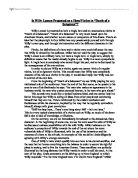Consider how one character other than Willy Loman in Death of a Salesman and one character (including the chorus) other than Oedipus in King Oedipus contribute to the 'action' of each of these plays.
“Linda is in Action, she’s not just sitting around” (Arthur Miller). Consider how one character other than Willy Loman in Death of a Salesman and one character (including the chorus) other than Oedipus in King Oedipus contribute to the ‘action’ of each of these plays.
Before looking at any individual characters or even plays, one must first look at the term ‘action’ and the different meanings or connotations it can have or suggest. In theatrical terms, there is a huge difference between plays that portray their action through physical action and plays that portray their action through the spoken word. Both types of play could be said to be ‘action packed’ but they convey their action in very different ways. Some people argue that ‘actions speak louder than words’, this was certainly true in the theatre of the nineteenth century, though that is only one period of theatre history. There are periods in theatre, both before and after the age of melodrama, that did not place such importance on the use of physical action. In Greek Theatre, tragedies such as ‘Oedipus the King’ were performed in huge amphitheatres, playing to audiences of thousands. This made it hard to include much physical action as it simply would not be seen by the audience unless it was a huge physical spectacle which would have been expensive and difficult to produce. Therefore, Greek Theatre laid more importance on the text as this could be easily projected around the amphitheatre; action was conveyed through the spoken word rather than through physical movements and gestures. A ‘dramatic revolution’ took place in the late nineteenth and early twentieth centuries, with a move back to ideas similar to those of the Greek Theatre. The plays of Ibsen and other playwrights of his era such as Chekhov, placed a huge importance on the use of dramatic texts. These playwrights wanted to present ‘real life’ in ‘real life ways’ and they did this by having their characters talk to each other rather than have big scenes of needless dramatic action just for the sake of it. This idea can be summed up in a quote from R.W. Emerson’s The Poet, “words are also actions, and actions are a kind of words”. So we see a similarity between Greek Theatre and the ‘revolutionary’ theatre of Ibsen, Shaw and Chekhov were talk is action, or as Pirandello puts it, “spoken action”. The talk is dramatic and it works its way to a conclusion without the need for a final ‘showdown’. Exciting things happen in these plays; but we don’t see them, rather we are told about them. Perhaps this allows playwrights to stretch the audience’s imagination a little further than they would do if every last event had to be portrayed through physical action.
The most comprehensive analysis of “spoken action” comes from Aristotle’s writings in about 4th century B.C. In ‘The Poetics’ Aristotle takes great care in laying out his idea of tragic form and with it, the form action takes in Greek Tragedy. According to Aristotle, action is an imitation of a process, in Oedipus the King, this is the process by which Oedipus discovers that that he has fulfilled the horrific prophecy he has tried so hard to avoid. By starting the play towards the end of an already familiar story, Sophocles avoids having to portray the dramatic events that have already occurred, they are told to us during the course of the play but the main action focuses on the outcome of these events. It is not the events themselves that are important, it’s what they mean to Oedipus and how by these events happening, he has fulfilled his prophecy while trying desperately to avoid it. However, Aristotle does not simply discount the use of physical action; he said “One should, as far as possible, work plots out using gestures”. He also, in a way, encourages naturalistic acting techniques when he says “Those who are actually experiencing the emotions are the most convincing; someone who is distressed or angry acts out distress and irritation most authentically”. This ties in with the ‘Law of Analogy’ which was developed in the late Eighteenth century and would have been the technique used in the ‘spoken action’ plays of Ibsen and Shaw a century later. The Law of Analogy is the way in which an actor feels an emotion and expresses it in a natural, physical way. It is not a pre set language of gestures, it requires actors to fully identify with their emotions and relay them to the audience in an honest, natural way that the audience can fully relate to. When studying Oedipus the King, I have found it useful to also look at Aristotle’s explanation of the form of tragic action. According to Aristotle, tragedy must include a Complication, which is the events from the beginning of the play or story leading to a character’s change in fortune, and a Resolution, the events from the beginning of the change of fortune to the end. Oedipus the King is considered an excellent example of tragedy because it not only includes a Complication and Resolution, but also includes a Reversal and Recognition. It is these last two features that I will look at in more detail as they make a large contribution to the action of the play.







